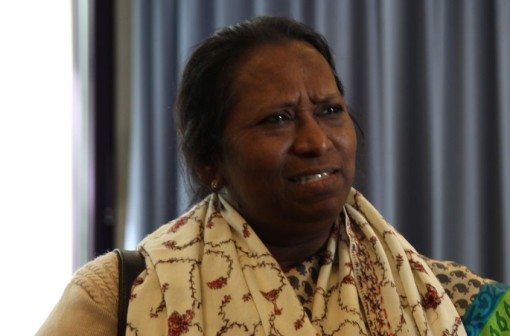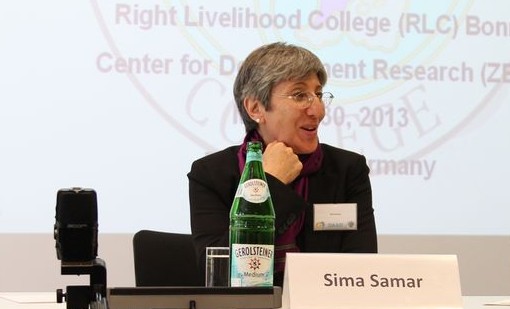For people interested in implementing change at the grassroots level, gaining the support from those with little power is a crucial step. One important way to do this is through education. This is the path chosen by Alternative Nobel Prize recipients Sima Samar and Ruth Manorama. The two women spoke with PhD students and other experts from around the world about the human rights situation in developing countries as part of a workshop hosted by the Right Livelihood College (RLC) Campus Bonn.
The title of this year’s RLC workshop at the Center for Development Research (ZEF) at the University of Bonn was “Mobilization for change: Re-defining local decision making and participation”. “The only for a country to develop in a positive direction is to improve the situation of its women,” emphasises Sima Samar from Afghanistan, who founded the Shuhada Organization in 1989 to do exactly that. The organisation now has 15 clinics and more than 100 schools for women and children throughout the country.
“A nation’s overall well-being can be gauged by the situation of its women. The more access women and other underrepresented groups have to healthcare and education, the more stable the productive the society.” It is a correlation that both of the visiting human rights activists agree on. “The fight against injustices only works if there is knowledge that rights are being abused in the first place,” says Ruth Manorama from India, who organises leadership training for Dalit women, who belong to the lowest social caste. The programme teaches these women to claim their rights and mobilise others to do the same.
Scientific proof of injustices
Science plays a critical role in development projects such as these. Sound research can provide empirical evidence of injustices, kindle discussion and impact political decisions and policy-making. “Even though the caste system has been officially abolished in India, it still very much exists a sociological study has proven this,” says Ruth Manorama.
For both of the visiting activists, the DAAD’s development-related postgraduate courses are an effective way to drive change. “The scholarship holders know their home countries inside and out. Once they have returned from Germany, their impact potential is far greater than aid received from the outside,” says Sima Samar. Also recognising the programme’s potential for triggering real change, Ruth Manorama adds, “The courses bring together people who want to make the world a more just and fair place.”
A truly unique opportunity
During the RLC Workshop at the ZEF, doctoral candidate from 12 different African and Asian countries also had the chance to present their research on human rights and poverty issues. Discussion topics included solutions for improving the water supply for the poor in India and self-help projects for people with HIV in Kenya. Ahmad E-Atrash from Palestine especially appreciates the diversity of the programme. “The event in Bonn brought together committed scientists from various cultural and academic backgrounds,” he says. “It was a unique opportunity for me to present my work and receive feedback from such a diverse group.”Ahmad E-Atrash, a PhD student focussing on strategic sustainability planning for the Bethlehem area, is a DAAD scholarship holder at the Technische Universität Dortmund.
What is the Right Livelihood College Campus Bonn?
The Right Livelihood College (RLC) Campus Bonn, opened in 2011, is financed by the DAAD and is seated in the Center for Development Research (ZEF) at the University of Bonn. The RLC campus in Bonn is one of four RLC campuses worldwide. It promotes exchange between Alternative Noble Prize laureates and doctoral candidates from developing nations. Access to the laureates’ rich and extensive knowledge and experience provides these young scientists and scholars from the developing world with the training they need to become effective decision makers and multipliers in their home countries. The DAAD provides three-year PhD scholarships for doctoral research conducted at the RLC Campus Bonn in the areas of social justice, poverty and sustainability.
www.rlc-bonn.de
What is the Alternative Noble Prize?
The Right Livelihood Award, widely known as the Alternative Nobel Prize, was presented for the first time in 1980 by the Right Livelihood Foundation in Stockholm. The prize recognises individuals and organisations who are "offering practical and exemplary answers to the most urgent challenges facing us today". RLA recipients are actively involved in the promotion of peace, human rights and environmental issues.
www.rightlivelihood.org
Interview with the Right Livelihood Award Winner Anwar Fazal







